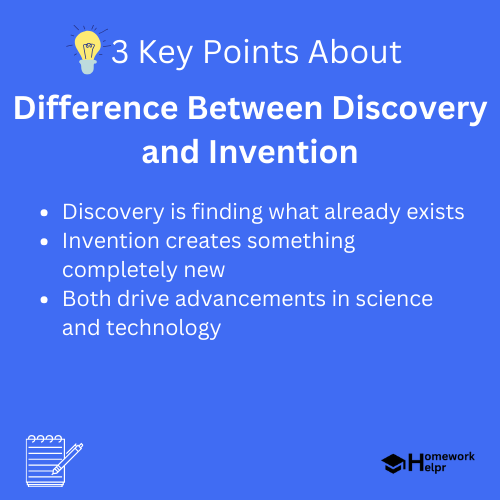📝 Summary
Understanding the difference between discovery and invention is crucial in science and daily life. Discovery refers to finding something that already exists, like the planet Pluto or penicillin, which enhances our understanding. On the other hand, invention involves creating something new, such as the telephone or the light bulb, which solves problems and improves lives. Both are important as discoveries can lead to inventions and together they drive progress in society. They share similarities like curiosity and the potential for significant advancements.}
Difference Between Discovery and Invention
Understanding the difference between discovery and invention is fundamental to the fields of science, technology, and everyday life. Although they may seem similar, the two terms have distinct meanings that play a crucial role in how we comprehend and interact with the world around us. In this article, we will explore each concept in detail, along with their key differences, examples, and significance.
What is Discovery?
A discovery is the process of finding or recognizing something that already exists in the natural world. This could be a new element, a phenomenon, or an ancient artifact that has significance. Discoveries add to our collective understanding of the universe and help further scientific knowledge.
For instance, the discovery of the planet Pluto in 1930 was not the act of creating something new, but rather the identification of a celestial body that was previously unknown to humanity. Similarly, the discovery of penicillin by Alexander Fleming in 1928 opened new pathways for medicine by revealing the life-saving properties of a fungus.

Definition
Discovery: The act of finding something that already exists but was unknown before.
Examples
Example 1: The discovery of gravity by Sir Isaac Newton led to the understanding of how objects fall to Earth. Example 2: The discovery of the structure of DNA by James Watson and Francis Crick unveiled the blueprint of life.
What is Invention?
Invention, on the other hand, refers to the creation of something entirely new that did not exist before. This could be a product, process, or method that has been devised to solve a problem or fulfill a need. Inventions often rely on existing knowledge but incorporate creativity and imagination to develop something unique.
For example, the invention of the telephone by Alexander Graham Bell in 1876 revolutionized communication by allowing people to speak to each other over long distances for the first time. Similarly, the invention of the light bulb by Thomas Edison made a substantial impact on how we illuminate our lives and conduct activities after dark.
Definition
Invention: The creation of something original that did not exist before.
Examples
Example 1: The invention of the wheel was a groundbreaking advancement in transportation. Example 2: The invention of the computer has transformed how we process information and communicate.
Key Differences Between Discovery and Invention
To fully grasp the distinction between these two terms, let’s summarize the main differences:
- Nature of the Action: Discovery involves recognizing existing phenomena, while invention entails creating new entities.
- Dependency on Prior Knowledge: Discoveries may rely on existing knowledge to reveal what is already present, whereas inventions often require innovative thinking.
- Impact: Discoveries can change our understanding of the world, while inventions typically lead to practical applications and improvements in daily life.
Importance of Discovery
Discoveries are the building blocks of scientific advancement. They help us understand the laws of nature and the universe, paving the way for further exploration and investigation. Each new discovery can lead to a series of inquiries that broaden our horizons and change our perception of reality.
Many significant breakthroughs in science have stemmed from discoveries. For example, the periodic table, created by Dmitri Mendeleev, is based on the discovery of chemical elements and their properties. Discoveries thus lay the groundwork for future inventions and innovations.
❓Did You Know?
Did you know that the world‚’ most famous chemical element, oxygen, was discovered by Joseph Priestley in 1774? It was initially termed “dephlogisticated air”!
Importance of Invention
Inventions play an essential role in modern society by improving our quality of life, enhancing productivity, and providing solutions to problems. They drive economic growth, create jobs, and significantly influence culture and daily living.
Examples of inventions that have transformed society include vaccinations, electric cars, and smartphones. Each of these innovations has addressed specific challenges and reshaped how we live, work, and interact with one another.
Similarities Between Discovery and Invention
While discoveries and inventions are different, they share some common ground. The most notable similarities include:
- Both require curiosity and a quest for knowledge.
- Both can lead to significant advancements in science and technology.
- Many inventions stem from prior discoveries, showing the interlinked nature of the two concepts.
Real-Life Examples of Discovery and Invention
To further illustrate the contrasting yet complementary nature of discovery and invention, here are a few real-life examples:
- Newton’s Laws of Motion: The discovery of these laws demonstrated how forces interact but did not invent any tools or devices.
- Smartphone Technology: The invention of smartphones amalgamated various technologies including computing power and telecommunications, which were previously discovered individually.
Conclusion
In conclusion, understanding the difference between discovery and invention is vital for appreciating how knowledge evolves over time. While discoveries unveil the hidden gems of our universe, inventions refine and repurpose that knowledge to create new solutions. Together, they fuel scientific inquiry, technological advancements, and the continuous evolution of society. By fostering curiosity and creativity, we can contribute to both discovering the unknown and inventing a better tomorrow.
Related Questions on Difference Between Discovery and Invention
What is a discovery?
Answer: The act of finding something that exists but was unknown before.
What is an invention?
Answer: The creation of something original that did not exist before.
How do discoveries and inventions impact society?
Answer: Discoveries enhance knowledge; inventions improve daily life.
Can inventions stem from discoveries?
Answer: Yes, many inventions are based on prior discoveries.
